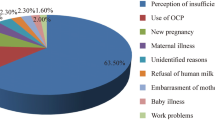Abstract
A hospital based study included 600 mothers who delivered at Kasturba Hospital Sevagram during 1996–97, to assess their knowledge and attitude regarding breastfeeding. The mothers were attending antenatal clinics of a Baby Friendly Hospital (BFH). The obstetric staff was trained regarding the practices following which mothers admitted to the hospital were interviewed within 24 hours of the delivery. Mothers were interrogated by a single interviewer regarding knowledge and attitude of breastfeeding within 24 hours of delivery by using a pretested semistructured open and close ended questionnaire. Three hundred and three mothers (50.5%) had attended antenatal clinics of KHS (booked), whereas 276 (46%) had antenatal check-ups at other health centres and 21 (3.5%) did not have any check-ups. Only 54.5% booked mothers and 30.3% unbooked mothers were informed regarding benefits of breastfeeding during antenatal visits. This difference was statistically significant. The booked mothers wanted to initiate breastfeeding early and did not want to give water supplementation, and were also significantly more knowledgoable as compared to unbooked mothers regarding benefits of breastfeeding, feeding of colostrum, avoiding prelacteal feeds, additional nutritional requirements during lactation and continuation of breastfeeding during maternal illnesses, child illness, pregnancy and maternal drug intake. Breast examination during antenatal check-ups was lacking in both the groups. Only 21 (6.9%) booked and 9 (3%) unbooked mothers had breast examination done during antenatal visits.
The data shows that subjects receiving antenatal care at KHS had varied ideas in regard to knowledge and attitude towards breast feeding, thereby suggesting that BFHI activities are useful, at least, to some extent. However, it was disheartening that despite including the obstetricians in the training of BFHI approach, nearly half the booked cases did not get information regarding benefits of breastfeeding and breast examination was not done in most during the antenatal visits. Systematic efforts must be made to ensure that all mothers attending antenatal clinics be managed as per WHO/UNICEF guidelines pertaining to promotion of breastfeeding.
Similar content being viewed by others
References
WHO/UNICEF Joint Statement. Protecting, promoting and supporting breastfeeding: the special role of maternity services. Geneva, WHO 1989.
Jellife DB, Jellife EP. Breastfeeding: world significance in obstetric practice.J Trop Pediatr 1983; 29: 130–132.
Lawrence RA. Management of mother-infant nursing couple. In:Breastfeeding-A Guide for the Medical Profession. St. Louis, CV Mosby Company 1985; 1974–179.
Recommendations of the International Federation of Gynecology and Obstetrics for action to encourage breastfeeding.Int J Gynecol Obstet 1982; 20: 171–172.
Bathija CG, Anand RK. Effect of perinatal motivation on breastfeeding in educated mothers.Indian Pediatr. 1987; 24: 933–937.
Sharma P, Dutta AK, Narayanan I, Mullick DN. Attitude of medical and nursing personnel to breastfeeding practices.Indian Pediatr 1987; 24: 911–915.
Simopoulos AP, Grave GD. Factors associated with the choice and duration of infant feeding practice.Pediatrics 1984; 74: 603–614.
Howard CR, Howard FM, Weitzman M, Lawrence R. Antenatal formula advertising: another potential threat to breastfeeding.Pediatrics 1994; 94: 102–104.
Howard C, Howard F, Weitzman M. Infant formula distribution and advertising in pregnancy: a hospital survey.Birth 1994; 21: 14–19.
Wright A, Rice S, Wells S. Changing hospital practices to increase the duration of breastfeeding.Pediatrics 1996; 97: 669–675.
Author information
Authors and Affiliations
Rights and permissions
About this article
Cite this article
Chaturvedi, P., Banait, N. Knowledge and attitude regarding breast-feeding, in mothers attending antenatal clinics. Indian J Pediatr 67, 259–262 (2000). https://doi.org/10.1007/BF02758164
Issue Date:
DOI: https://doi.org/10.1007/BF02758164



